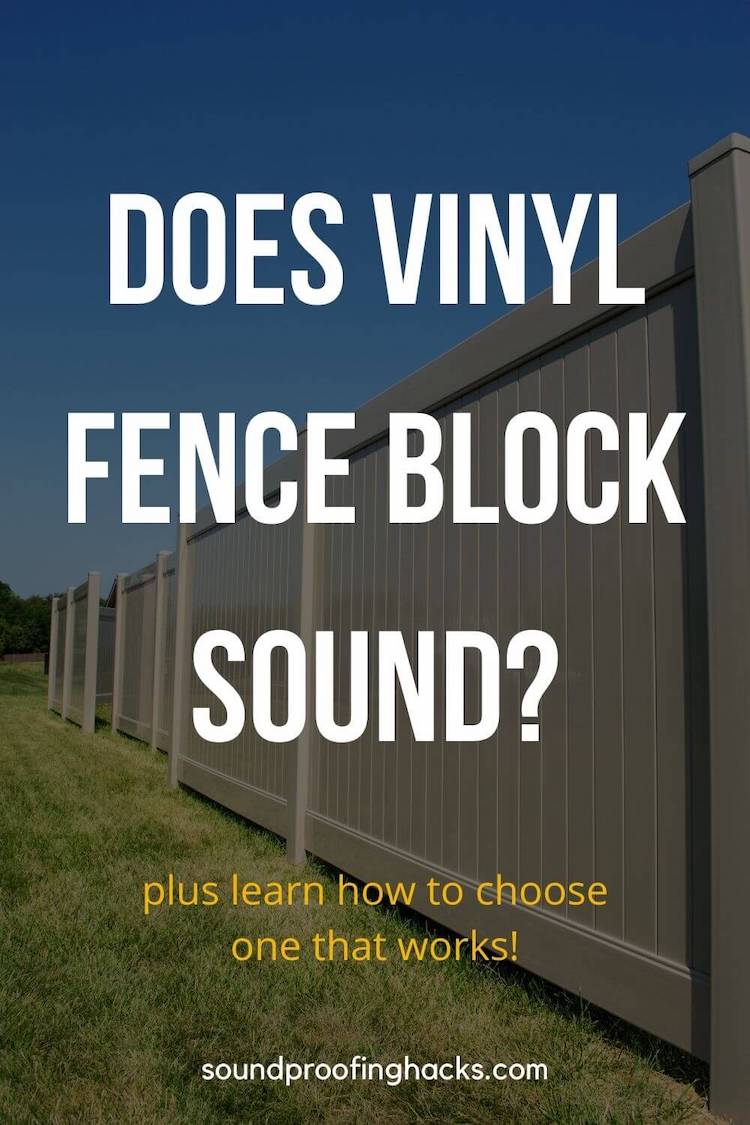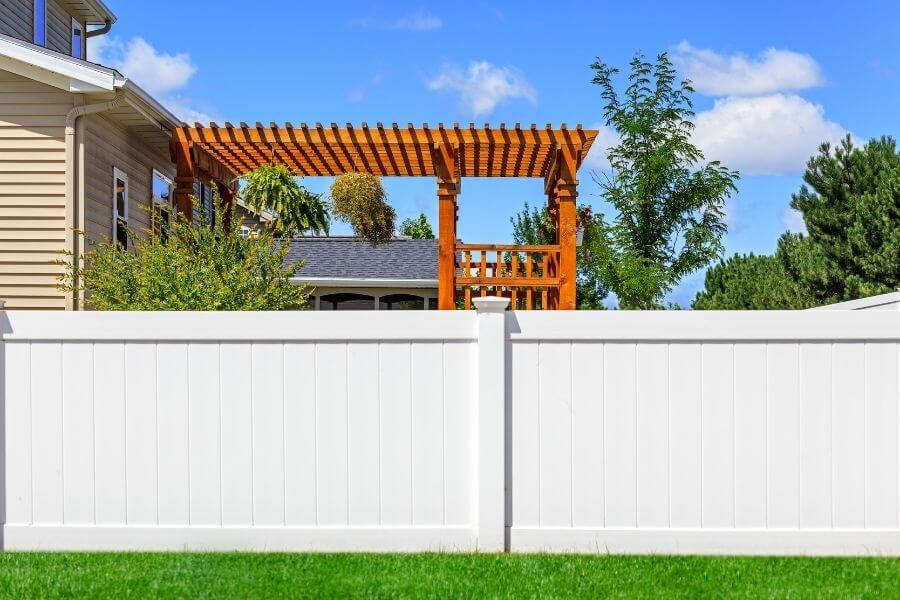Does Vinyl Fence Block Sound?
Outside noises might be irritating to the serene setting of your house or yard if you live near a busy street or have a neighbor with a barking dog. Installing a fence could solve this problem, but does a vinyl fence block sound and noises?
While no yard is completely soundproof, a soundproof vinyl fence can help to lessen and prevent the noises that irritate you the most. A well-built vinyl privacy fence works as a sound barrier from the outside world. With the addition of privacy fencing, traffic, lawn equipment, and a variety of other noises can be greatly decreased.
You also get the extra benefit of security and increased property value. Talk about killing three birds with one stone!
Thank you for being here. We are reader-supported. If you have a minute, do check out our recommendations for the BEST SOUNDPROOFING MATERIALS before you go.
Note: This post may contain affiliate links. Learn more on the disclosure page.

Contents: Skip to section
What is Vinyl Fencing?
Vinyl is a chemical compound made up of ethylene and chlorine (both of which are natural substances). When these elements come together, they make Polyvinyl Chloride, or PVC, which is also known as “Vinyl.”
Vinyl is now the world’s second-largest manufactured and marketed plastic resin. Vinyl is also known as “infrastructure plastic” since it is utilized for building and construction in 76 percent of cases. This is one of the main reasons why vinyl fencing is so popular.
This Polyvinyl Chloride (PVC)-based material is low-maintenance and won’t crack or splinter like wood.
Buyers choose them because they don’t decay, attract insects, or require refinishing. It’s also available in a variety of colors and styles, ranging from short picket fences to tall privacy fences.
It can even be textured to make it look like wood which takes care of the design aspect of your home exterior too.
PVC Vinyl Fencing Benefits
Vinyl is five times as durable as wood. That’s right, it’s five times more powerful!
It also won’t degrade or succumb to rust or vermin, allowing it to last for decades.
Vinyl fences, unlike wooden fences, have a flexible construction with remarkable UV resilience, and it won’t blister, rot, or peel because it doesn’t absorb moisture.
It is completely safe to place it near a swimming pool or a sprinkler.
Wood, on the other hand, is a known termite magnet and is extremely vulnerable to moisture damage.
Vinyl fences also allow you to select a color, design, and an eye-catching pattern that complements the surrounding structures. So even if you prefer the look of wood, vinyl can provide a similar effect without the hazards.
Because vinyl fences are easy to clean and don’t require staining or painting, you may avoid the trouble of ongoing upkeep and care.
Furthermore, because vinyl fences do not allow fungus to develop, you will only need to pressure wash them on a regular basis to keep them clean and dust-free.
You can clean stains with a ground hose and a mixture of water and dishwashing liquid or soap.
Here are the key benefits of vinyl fencing summarized:
- Minimal maintenance, affordability over long term
- Eco-friendly substance compared to other materials (besides wood)
- Resistant to moisture and humidity
- Strength
- Flexibility
- Vinyl is free of harmful chemicals
- Easy Installation
- Privacy
- Attractive Aesthetics
- Lifetime Warranty (mostly)
Disadvantages of PVC Vinyl Fences
In the section above, we have discussed lots of the benefits that come with vinyl fencing, and they do seem pretty incredible.
But is vinyl fencing the perfect solution? Well, not 100%. Here’s a look at some of the disadvantages of using vinyl fencing.
One of the primary drawbacks of a vinyl fence is that it does not hold up well in inclement weather.
If you live in a region where severe wind gusts are common, a vinyl fence may not be the best option because it can flex or become dislodged from the ground. It’s also important to remember that vinyl fence does not expand or shrink in response to changes in temperature.
When the weather gets colder outside, the material becomes more prone to breaking or shattering, making it more vulnerable to harm in the event of a direct hit.
In addition, unlike wood, vinyl fences are not able to endure big impacts. If the vinyl breaks due to an object or harsh weather, it cannot be fixed like a wood or metal fence, and you will need to replace the entire area.
Vinyl fences, unlike wood, are prone to mildew. Aside from being a health hazard, mildew makes your fence look dirty and unsightly on your property.
Here is a summary of all the disadvantages of vinyl fencing:
- Extreme weather can damage the material
- May not be as easy to get the desired look you want
- Not a natural material
- Colors will fade over time
- High initial costs
- Difficulty in DIY installation requires professional
- Algae, mold, and mildew can cause staining

How Much Noise Does a Vinyl Fence Block?
In comparison to wood fencing, which blocks just 75% of direct sound, the durable vinyl and rotationally molded polyethylene fences block up to 98 percent of direct sound with a sound transmission class (STC) rating of 26.
Furthermore, these long-lasting panels can be used in both residential and commercial environments.
How to Choose Vinyl Fencing?
There are several reasons for installing a fenced-up area around your home as discussed above, and now that you have made up your mind, what are the key factors to consider when choosing vinyl fencing?
Let’s take a look at the following factors:
Weight
Because weight dampens sound, a sound-deadening fence must be heavier than standard options. Sound barriers should also be thick and reinforced with steel.
Steel-reinforced rails will make a big difference in any installation, but you should also take note that it comes with a high cost.
Not forgetting that thicker fences will have a better soundproofing effect too, so be sure to go with a fence material of at least 0.5 inches thick.
Height
Because sound can still go over the top of a fence, consider panels that are taller than standard fencing for more sound dampening.
There are options available for 8 to 12-foot-high walls by stacking individual panels.
Be sure to check and review local or HOA codes before constructing to ensure that the fencing isn’t too high and doesn’t obstruct the view of passing motorists.
If you are engaging a professional, they should have this knowledge, but it doesn’t hurt to bring this up.
Another issue with height that you need to know is the fence post. These are crucial structures for your fencing, and as a rule of thumb, they should be at least 50% more than the height of your fence. If you have a 6-foot-tall fence, it needs to have at least 3 feet in the ground to ensure stability.
Structure
Solid structures block sound better than those with holes or gaps since sound can’t travel through them.
As a result, whenever possible, choose a privacy fence that does not contain holes or small spaces between boards, such as classic wood fencing.
Vinyl fencing checks all the boxes as there will not be tiny gaps that will allow sounds to pass through easily.
Take note to also pay close attention to the components of the fence.
If you come across fence panels being fastened with brackets, you should really stay away.
The most common materials for these brackets are plastic or painted steel.
Plastic brackets can’t survive high winds, and metal brackets rust quickly, undermining the objective of a low-maintenance vinyl fence.
To prevent drooping, a good vinyl fence should have a heavy-strength galvanized steel reinforcement in the bottom rail.
Avoid buying from regular suppliers
In the event that you are going with self-installation, I would highly recommend that you avoid getting your supplies from big box stores.
Typically, the range that they carry is of lower quality, and if you are not a professional, it can be hard to tell which is which.
Furthermore, you will not receive expert assistance; a big-box store’s “sales expert” may be a garden department employee.
If you want a solid and long-lasting vinyl fence, go to a store that specializes in vinyl fencing and will advise you on the best options for your needs and budget.
Ask for virgin PVC
If you are out shopping for PVC fences, pay attention to the type of PVC being used. High-quality fences are made of virgin PVC, while the lower-priced ones are usually made of recycled PVC.
Recycled vinyl, unlike other recycled materials, is brand new.
The difference is that it’s not created from a single source of raw material; in the case of vinyl fencing, scraps of vinyl left over from other products are usually used.
As a result, while recycled things are usually great in many situations, they are not the best material for fences.
Because recycled vinyl has a tendency to produce mold and mildew, most professional fencing manufacturers only sell virgin vinyl. If you spot vinyl with black spots on them, you know that it is most likely because it was made with recycled vinyl.
Product warranty
Nothing lasts forever, and this applies to your brand new vinyl fence too. Over time, wear and tear will happen, or there could be external factors not within your control that damages the fence.
In such cases, you will need to return to the manufacturer or contractor for help. Having a lifetime warranty certainly eases a part of this headache, and that is what you should look out for when hiring a third party.
Vinyl Fencing Cost
There are quite a number of factors that influences the price of installing a vinyl fence, namely the design, height, gates, slope of land, among others. There could also be local rules that require you to pay a fee, so it is best to check that out in order to work out your budget.
A professional contractor would be able to give you a close estimate of what is required, but based on data across the nation, here is what you can expect:
- $28 per linear foot (national average)
- Assuming a requirement of 150 feet, that will work out to $4,200
For perspective, if you are trying to install one on your own, you would likely need to fork out close to $3,800 to install a vinyl fence of the same size. That is assuming you are starting from scratch and will need to purchase all the materials and tools required.
Which Fences Are Best for Blocking Road Noise?
Well, PVC privacy fences are one of the best options you can consider, but there are also a couple of options you can look at:
- Wooden fences – Red cedar fences, especially when designed as sturdy privacy fences, offer excellent sound barriers. Tongue-and-groove boards with thick tongues and grooves are perfect. To further enhance its effectiveness, consider placing mass-loaded vinyl directly in the wooden fence for even more sound absorption. Choose one that says “outdoor use”. Any seams should be sealed with acoustic caulk, and the sheets should be overlapped. The solid wood panels are then connected to the frame, with the mass-loaded vinyl sandwiched in between.
- Adding greenery – To absorb sound even better, rich, lush foliage can be added to both wooden and PVC fences. Between the fence and the road, and/or between the fence and your home, heavy bushes and trees can be planted. Look for types that are evergreen, as they will provide noise reduction all year.
- Tall fences – check with your local authorities or contractor about the maximum height your fence can go. The taller the fence, the more effective it will be at blocking out noise from the roads.
Thanks for reading till the end. Soundproofing Hacks is supported by users like yourself. If you found our content useful, consider buying us a coffee here. It goes a long way in keeping our doors open. Thank you.
In conclusion: Does Vinyl Fence Block Sound?
As you can see, there are lots of benefits when it comes to using a vinyl fence while weighing the disadvantages. I do think that in general, the plus points outweigh the negative ones.
If you are starting this project, I hope this article has helped you in the decision process. Good luck!
Continue reading:
- What Is Acoustic Fencing: Real Ways to Reduce Noise!
- 5 Ways How To Silence A Microwave
- How to fix squeaky floors in apartment or home: 8 effective steps
- Sound Deadening Curtains: Do They Actually Work? See 5 That Does
- How To Soundproof Tents: 4 Fast And Effective Ways That Work
- Double Drywall or QuietRock for Soundproofing?
- 5 Best Weather Stripping for Soundproofing
- 6 Best Rubber Floor Mats for Soundproofing
